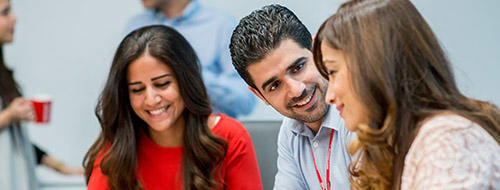It started with scribbles on a page. My stick figures tried to show a simple but exciting vision for a complex issue. I drew a plan for how we could achieve a future with less soft plastic in landfill – a future where soft plastic is seen as a resource not a waste. In that moment, my team and I realised we needed to stop thinking about the barriers to this vision and start designing the future.
Our vision is within reach
It’s rare to be more excited by the KitKat wrapper than by the chocolate inside – but this is that moment!
In an Australian first, a group of companies collaborated to produce a KitKat wrapper that is Australia’s first soft plastic food wrapper made with recycled content.
What started out as a simple drawing years ago is now a tangible example of how Australia can close the loop on recycling soft plastics.

So how was the mammoth task achieved? And what does it mean for the future of sustainability in packaging?
The journey: from waste to resource

Soft plastics are challenging to recycle at scale. The lack of both collection and processing infrastructure in Australia for soft plastic makes it difficult to keep waste out of landfill and impossible to meet demands for packaging with recycled content.
The illustration above, a polished version of the original drawing, depicts how we started to think differently to solve this problem – our vision was to bring the value chain together to close the loop on recycling soft plastics.
Here’s how the process works:
Today, this is a vision – Australia does not have the infrastructure to do this at scale. But it's within reach. Our KitKat wrapper is all the proof we need!
A true team effort
The initiative to create a KitKat prototype emerged from a trial underway on the NSW Central Coast, where Australian recycler iQ Renew and Nestlé are working together to gather soft plastics through kerbside collection. In the trial, householders put their soft plastics into a bag, tag the bag, and place it into their kerbside recycling bin for collection. These collected plastics, together with plastics collected via the REDcycle supermarket soft plastic collection, formed the starting point for the project.
From there, Nestlé, together with CurbCycle, REDcycle, iQ Renew, Licella, Viva Energy Australia, LyondellBasell, Taghleef Industries and Amcor brought their individual expertise to bear to collect and process the waste soft plastic, turn it back into oil, and create the prototype wrapper.
A collaboration of this many companies, working right through the value chain, is extremely rare. Even more rare is that everyone was driven by nothing more than a common vision and a willingness to just give it a go. But I am proud to say that we are well on our way. Having a break with a KitKat never felt so good!
Our prototype: A promise for the future
Our pack is a prototype, but more than that - it's a promise for the future. We have shown that there’s a pathway to solve the soft plastics problem. We have the will to create a circular economy; we have outstanding technology; we have a value chain ready to leap into the future. We just need to work together.
Nestlé’s vision is that none of our packaging, including plastics, ends up in landfill or as litter. This achievement will do so much more than help us to achieve our goal of making 100% of our packaging recyclable or reusable. We know that this task is bigger than us – and the impact could be extraordinary.
That’s why we are excited to work with government, industry and Australians to bring this vision to life.
Together, we can put a wrap on soft plastics.
For more information:
Jacky Nordsvan, Head of Packaging, Nestlé Oceania
Planet




